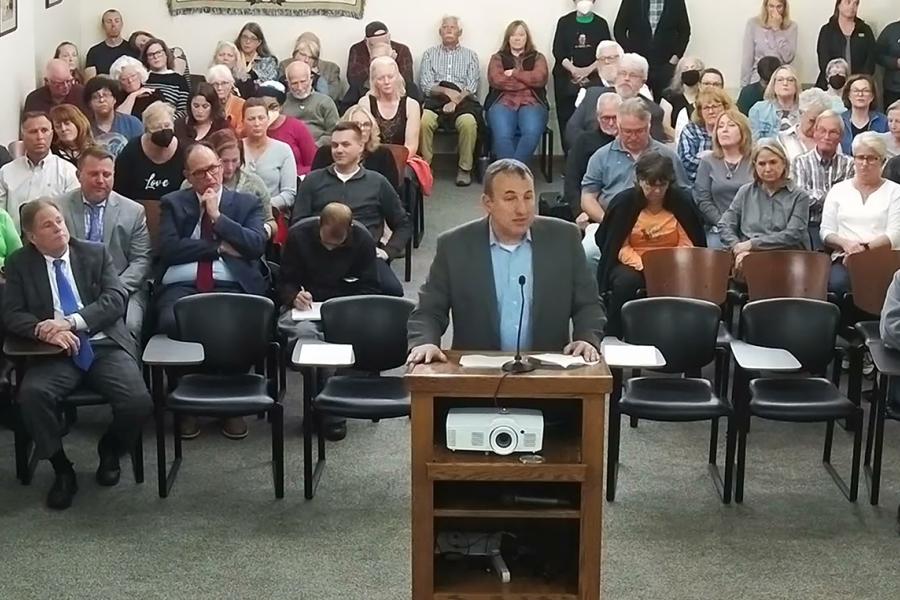New statutory meeting requirements for municipal governing bodies

By ELISHA HODGES
MTAS Legal Consultant
The 113th General Assembly amended the Tennessee Open Meetings Act with two separate public chapters that will impact your municipality.
Those public chapters are Public Chapter 213,Acts of 2023 and Public Chapter 300, Acts of 2023. The summary and comments on both are found below.
Chapter No. 213 (HB0023/SB0027). “Agendas Required.” Amends Tennessee Code Annotated, Title 8, Chapter 44, Part 1 by adding that at least 48 hours prior to a meeting of the local legislative body (city, town or metropolitan government council, board of commissioners, or board of mayor and aldermen) the agenda for the upcoming meeting must be made available to the public, at no charge, in a place accessible to the public. Requires the agenda to reasonably describe the matters to be deliberated upon or acted on during the public meeting.
Authorizes the local legislative body to deliberate or act upon matters not on the agenda if the body follows its bylaws or properly adopted rules or procedures and all other applicable state laws. Provides that this authorization is not to be used to circumvent the spirit or requirements of the open meetings act by withholding items from the agenda to avoid public disclosure of a matter to be considered by the body.
Permits a local government legislative body to utilize a website it maintains to make an purposes of complying with the requirement that the agenda be made available to the public at no charge in a place accessible to the public. Effective: April 25, 2023.
Please note the language that allows the local legislative body to deliberate or act upon matters not on the agenda “if the body follows its bylaws or properly adopted rules or procedures.” Staff in each respective municipality should review the municipal code to determine whether Robert’s Rules of Order Newly Revised has been adopted as the rules of order and parliamentary procedure that govern the transaction of business at the meetings of the local legislative body. For municipalities with municipal codes maintained by MTAS, provisions adopting Robert’s Rules of Order Newly Revised are typically codified in title 1 of the code. The 12th edition of Robert’s Rules of Order Newly Revised is currently available.
If the local legislative body has not adopted Robert’s Rules of Order to govern the transaction of business at its meetings or if the reference in the municipal code is to an older version of the rules, the local legislative body should consider adopting the rules or amending the current language in the code to read, “The rules of order and parliamentary procedure contained in the current edition of Robert’s Rules of Order Newly Revised shall govern the transaction of business by and before the (insert the type of governing body) at its meetings in all cases to which they are applicable and in which they are not inconsistent with provisions of the charter or this code.”
Chapter No. 300 (HB0023/SB0027). Public comment period required. Amends Tennessee Code Annotated, Title 8, Chapter 44, Part 1 by requiring a governing body to reserve a period for public comment, at each public meeting, where the public has the opportunity to comment on matters that are germane to the items on the agenda for the meeting. Provides that this section does not apply to:
- a meeting of a governing body, or a portion thereof, where the governing body is conducting a disciplinary hearing for a member of the governing body or a person whose profession or activities fall within the jurisdiction of the governing body; or
- a meeting where there are no actionable items on the agenda.
Authorizes the governing body to adopt reasonable restrictions on the period for public comment, including restrictions related to the length of the public comment period, the number of individuals who can speak during the period, and the length of time each individual can speak. Includes that restrictions may also require an individual to sign up in advance of a meeting in order to speak during the meeting. Requires the governing body to take all practicable steps to ensure that opposing viewpoints are represented fairly if those with opposing viewpoints desire to comment.
Requires the public notice for a meeting to include the manner in which an individual must sign up to speak at the meeting, when advance notice is required. Effective July 1, 2023.
Please note that this requirement is applicable to all governing bodies. For purposes of this provision, “governing body” means “members of any public body which consists of two (2) or more members, with the authority to make decisions for or recommendations to a public body on policy or administration.” Tennessee Code Annotated § 8-44-102(b)(1).
Based upon the definition, not only will your local legislative body be required to have a period of public comment during its meetings, but so will governing bodies like the planning commission, tree board, budget committee, and parks and recreation board. This requirement becomes effective July 1, 2023.
As such, the local legislative body should review the municipal code to ensure that the adopted order of business includes a period for public comment. Additionally, the local legislative body, as well as all other governing bodies that have the authority to adopt rules, should consider conferring with the municipal attorney or the attorney that advises the governing body as soon as possible, to prepare and adopt the types of “reasonable restrictions” described in the public chapter before July 1, 2023.
Please review the legislation contained herein with your municipal attorney, as these summaries are based upon the MTAS attorneys’ interpretation of the new laws. The legislation will be discussed in depth during the upcoming MTAS Legislative Update classes in June 2023. However, if you have questions before the classes, please contact your assigned MTAS attorney.
